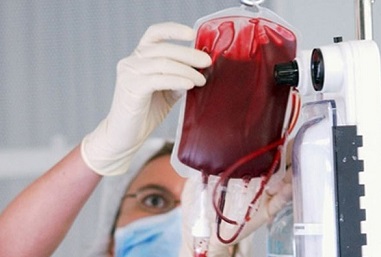Study Shockingly Finds That Cerebral Amyloid Angiopathy (CAA) That Causes Brain Hemorrhage Risk Can Be Transmitted Through Blood Transfusions!
Nikhil Prasad Fact checked by:Thailand Medical News Team Sep 17, 2023 2 years, 5 months, 6 days, 13 hours, 23 minutes ago
Brain Health: In a new study, researchers from the Karolinska Institute and several other esteemed institutions have unearthed a startling connection between blood transfusions and the risk of spontaneous brain hemorrhages. This research adds to the growing body of evidence supporting the theory that cerebral amyloid angiopathy (CAA), a vascular condition characterized by the accumulation of proteins in the brain's tiny blood vessels, might be communicable between individuals. While the risk associated with blood transfusions remains minimal, the implications of this study are profound, suggesting the potential transmissibility of CAA and prompting further investigations into this intriguing phenomenon.
 Cerebral Amyloid Angiopathy (CAA): A Culprit Behind Brain Hemorrhages
Cerebral Amyloid Angiopathy (CAA): A Culprit Behind Brain Hemorrhages
To comprehend the implications of this recent study, it is crucial to first understand the role of cerebral amyloid angiopathy (CAA) in brain hemorrhages. CAA is a vascular condition in which abnormal protein deposits accumulate in the brain's blood vessels, making them fragile and prone to rupture. This condition is recognized as a significant contributor to spontaneous and recurrent brain hemorrhages, which can have debilitating and life-threatening consequences for affected individuals.
Previous
Brain Health research has indicated that CAA can potentially be transmitted from one person to another through various medical procedures, such as neurosurgical interventions and treatments involving specific growth hormones. However, the study we are about to delve into offers a new perspective on the potential transmission of CAA via blood transfusions.
The Study: Unveiling a Connection Between Blood Transfusions and Brain Hemorrhages
The study, led by experts from the Karolinska Institute, along with researchers from Södersjukhuset, Karolinska University Hospital in Sweden, the University of Copenhagen in Denmark, KU Leuven in Belgium, and other institutions, delves into the intriguing possibility of a link between blood transfusions and the risk of spontaneous brain hemorrhages.
The study team analyzed a vast dataset from the Swedish-Danish transfusion database known as SCANDAT, which contains comprehensive information on blood donors and patients who received transfusions from the 1970s onwards. The study included over a million patients and aimed to investigate whether individuals who received blood from donors who later suffered recurrent brain hemorrhages were at an increased risk of experiencing brain hemorrhages themselves.
Key Findings and Implications
The study's findings are indeed startling. Patients who had received blood from donors who subsequently suffered multiple spontaneous brain hemorrhages were more than twice as likely to experience a single spontaneous brain hemorrhage themselves. The association was observed in both the Swedish and Danish cohorts, indicating the robustness of the results. However, it's crucial to note that the absolute risk of experiencing a brain hemorrhage after a blood transfusion remains exceedingly low, as only 0.1 percent of the donors in the study later suffered recurring brain hemorrhages, r
esulting in only a few affected patients.
The significance of this study lies not in raising alarm over the safety of blood transfusions but rather in shedding light on a potential avenue for the transmission of CAA. While the findings suggest a link between blood transfusions and some types of spontaneous brain hemorrhages, the study does not establish causality. It is possible that other factors could contribute to the observed increase in risk.
Further Research and Confirmation
Understanding the potential mechanism behind this association is essential for unraveling the mystery of CAA transmission. To this end, the researchers have devised a plan to gather more evidence and corroborate their hypothesis. They intend to examine samples from the Danish Blood Donor Study biobank to identify any aberrant proteins associated with CAA. Additionally, they aim to obtain CAT and MR scans from both affected donors and patients to gather further supportive evidence.
Dr Jingcheng Zhao, the study's first author, emphasizes the need for caution and further research, "This study does not demonstrate causality, so the observed increase in risk could depend on other factors. More research is needed to confirm our findings and understand the potential underlying mechanism."
Conclusion
In conclusion, the recent study on the potential link between blood transfusions and the risk of spontaneous brain hemorrhages has unveiled a captivating area of research. While the risk associated with blood transfusions remains extremely low, the findings suggest a possible connection between transfusions and the transmission of cerebral amyloid angiopathy (CAA). This revelation could have far-reaching implications in the medical field, potentially shedding light on the transmissibility of CAA and its role in brain hemorrhages.
As the researchers continue to investigate this intriguing phenomenon and seek confirmation of their hypothesis, it is clear that more research is needed to fully understand the underlying mechanisms and causality. Nonetheless, this study serves as a poignant reminder of the complex and interconnected nature of medical conditions and the importance of ongoing scientific inquiry in unraveling the mysteries of the human body.
The study findings were published in the Journal of the American Medical Association (JAMA).
https://jamanetwork.com/journals/jama/article-abstract/2809417
For the latest on
Brain Health, keep on logging to Thailand Medical News.
